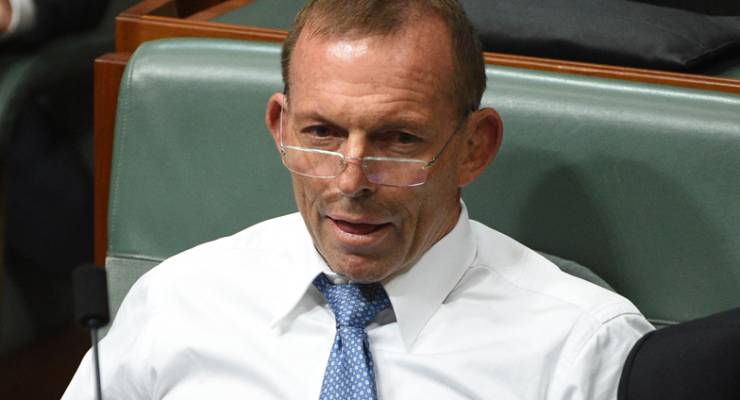
It might be a half-smart ploy by Malcolm Turnbull to put his vanquished rival Tony Abbott into Defence, as many have mooted. Defence is the notorious graveyard of ministers, where many a career on both sides of politics has come a cropper, David Johnston and Kevin Andrews being only the two most recent casualties on a long list. It would be an olive branch to Abbott’s little band of fanatics within the party, and keep Abbott away from domestic politics and locked in Cabinet solidarity, albeit with the regular risk of leaks, until Abbott’s career ended, as so many others have, at Russell Hill.
But the problem is, Abbott isn’t actually ministerial material, despite his experience. Indeed, his experience demonstrates some of the basic flaws in his capacity to run a portfolio.
Abbott owed his rise in the Howard years primarily to favouritism: the then-Prime Minister liked the young, aggressive hardliner with the reactionary social views and regularly promoted him until he became Health Minister in the final term of the Howard government. But as many of Abbott’s colleagues noticed, in doing so Howard overlooked Abbott’s most notable flaw, a lack of grasp of detail and an interest in both economics and fiscal policy. As Health Minister, Abbott’s cabinet submissions were notoriously poor and often lacked the kind of fiscal rigour that other ministers were expected to abide by. Not for nothing did Peter Costello famously dismiss Abbott as an “economic illiterate”. Colleagues found it deeply annoying that Abbott was indulged in that manner by Howard.
This lack of fiscal rigour carried directly through into Abbott’s time as Prime Minister. Despite endlessly railing about debt and deficits prior to becoming Prime Minister, once Abbott was in government, his actions betrayed a profligate, undisciplined leader: spending blew out from just above 24% of GDP under Labor to 25.9% of GDP in 2014 and, to incoming Treasurer Scott Morrison’s mortification, it had reached 26.2% of GDP — higher than Kevin Rudd’s GFC stimulus — when Abbott was removed. Abbott as Defence Minister is thus likely to prove a source of constant demands for more and more spending, with no interest in efficiency or finding savings.
The other characteristic of Abbott’s time in Health was that the key decisions in the portfolio were actually taken by the Prime Minister’s Office, not Abbott and his staff, especially as Howard ramped up spending toward the end of his final term. Howard had put one of his favourite PM&C staff, Jane “kids overboard” Halton, in as departmental secretary in 2002 to reinforce centralised control. The result was that Abbott was often left pedalling about the country as the face of the government’s efforts on health while the real decisions were made in the PMO and Health staff ordered to do the necessary paperwork.
This, too, found its way into Abbott’s time as Prime Minister, with a relentless command-and-control approach by his PMO which turned every portfolio into an Abbott-era Health Department in which ministers were routinely overridden and ignored by Abbott’s staff, and a ready abandonment of proper process by Abbott, who would take proposals to News Corp before raising them in Cabinet.
Abbott also demonstrated a tonedeafness to his colleagues that would re-emerge as an inability to accept that he was about to be dumped by his party as Prime Minister despite being repeatedly warned. Most notoriously, Abbott was humiliated when he and Howard were defeated on a bill to enable RU 486 to be allowed by the Therapeutic Goods Administration. Female Liberal MPs helped spearhead the effort, to which Abbott reacted with almost clueless aggression while railing at the availability of abortion.
Talent isn’t, of course, necessarily a prerequisite for ministerial office: Howard, an astute judge of such things who recognised George Brandis’ ineptitude enough to keep him out of the ministry almost to the very end of his government, once made Wilson Tuckey a junior minister. And a clod like Peter Dutton, who makes Abbott look savvy, is Malcolm Turnbull’s Immigration Minister. But giving Abbott a portfolio commensurate with his status as a former Prime Minister would mean his significant flaws as a minister would have the potential to inflict significant damage both in political and policy terms on the government.








My only real memory of Abbott’s time as Health Minister, was that the Howard government spent about $30,000,000 of public money on a pre-election ‘public education campaign’, to inform the public, that Health wasn’t in as big a mess as the public thought it was.
Then there was his “cast iron commitment” re the Medicare safety net – snapped after the election, by Honest John Howard – laughing it off himself, on his Fourth of July 2012 7:30 Report July interview.
Four Corners Interviewer: Will this Government commit to keeping the Medicare Plus Safety Net as it is now in place after the election?
Abbott: Yes.
Interviewer: That’s a cast-iron commitment?
Abbott: Cast-iron commitment. Absolutely.Interviewer: Eighty per cent of out-of-pocket expenses rebatable over $300, over $700?
Abbott: That is an absolutely rock solid, ironclad commitment.
Make him Minister for Sport and Recreation in the outer ministry.
He could then indulge his passion of tri-athling around the nation and not get involved in serious government.
That’s would be an absolute insult to the sport and rec community
The trouble with finding a job for Tony Abbott is that he would regard any offer of a job that he was capable of doing as beneath him. Maybe Rupert could find him something.
With some anger management training, and if he could be taught manners, he may have a future flipping burgers somewhere.
‘Clod’ is an apt term for Mr.Dutton. He does not deserve his salary and I am amazed that enough people voted for him this time around.